新译林牛津英语6B Unit2-2 Fun+Grammar(201503)
译林牛津版六年级英语下册教案 Unit2 Period 2

Unit 2 Good habits第二课时一、教学内容:Unit 2 Good habits-Grammar time & Fun time二、教学目标:1.能够在句子中正确应用程度副词修饰动词。
2.能够应用本课所学的句型“Do you...?”“Yes, I do./No, I don’t.”进行问答。
3.培养学生养成良好的学习习惯和生活习惯。
三、教学重点:1.能够在句子中正确应用程度副词修饰动词。
2.能够应用本课所学的句型“Do you ...?”“Yes, I do./N o, I don’t.”进行问答。
四、教学难点:1.能够在句子中正确应用程度副词修饰动词。
2.能够应用本课所学的句型“Do you ...?”“Yes, I do./No, I don’t.”进行问答。
五、教学过程:Step 1 Free talkT: Do you get up early in the morning?S: ...T: That’s a good/bad habit!T: I have some habits too, can you ask me? (出示动作图片)S: Do you have your meals in the morning?T: Yes, I do. I always...S: Do you read books?T: Yes, I do. I usually...S: Do you clean the room?T: Yes, I do. I sometimes...T: I have some good habits but I have bad habits too. Look at my panda eyes, I always go to bed late at night, it is a bad habit, you should go to bed early.Step 2 PresentationT: As a good student, we should have good habits, let’s make a good habit proposal step by step.1. Step 1 How to ask others.T: You know my habits, how about you? let’s play a game. Who want s to be my partner?Fun time----(1) T: Pick one...(2) S: Pick one...(3) Pair workT: Now, it’s your turn, pick one picture from the envelope and practice in pairs!Magic box----T: Good job, boys and girls, you can ask others about their habits. Let’s have a rest.2. Step 2 How to make.First, Pick 4 different color papers from the box.Second, discuss in groups and make them into a sentence, then stick it to the long paper.Third, read in group and show us in your own way.评价:I t’s interesting/funny...Here are some sentences for you, can you read them?Look, these words are subjects/adverbs of frequency/verbs/adverbial modifiers. Do you understand?Step 3 Consolidation1. Step 3 Do a surveyT: Great, l et’s mo ve to step 3 do a survey. First, let’s make a survey form.Here is an example, fill one word into the blank and make it a good habit.S: Early.T: Can you read it?S: Go to bed early at night.T: Here is another form, can you fill this line with your group member? Let’s check together. The first one is early, please read it.The first one is well, please read it.The first one is early, please read it.They are all good habits. Now, let’s do a survey.Do you go to school early in the morning? (随机问一名学生)S: Yes, I do. (将该学生姓名填入表格)Do a survey in your groups with this form.提示句型:Do you...? Yes, I do./No, I don’t.T: Ok, times up, I am going to be the first one. (教师示范)...It’s time for you, who want s to tell us about your group members? S: ...2. Step 4 Make a good habit proposalT: Let’s make a good habit proposal according to your group survey.Here is my good habit proposal. Work in groups to finish your good habit proposal. Here are some tips for you.评价:If everyone in your group says one sentence, you will get 3 stars.If all the members in your group say together, you will 2 get stars.If only group leader says, you will get 1 star.Step 4 Homework1.Think of some more good habits and share with your classmates.2.Put up your good habit proposal in the classroom or at home.3. Review the two parts and then copy the sentences in Grammar time.六、板书设计:Unit 2 Good HabitsA: Do you...?B: Yes, I do./ No, I don’t.always usually often sometime never。
最新译林牛津版小学英语六年级下册Unit2 Period2重点习题

Period2【基础练习】一、补全单词并写出中文意识。
1. qu tly ( )2. rea ( )3. der ( )4. w ak ( )5. n er ( )6. bit ( )二、根据句意及中文提示完成下列句子1.The twins (经常)do their homework on time.2. I (从不)go to school late.3. Liu Tao (有时)feels sleepy in the morning.4. I (总是)go to school on time.5. He (通常)finish his homework before dinner.三、单项选择( ) 1. you sing well?A.AreB.DoesC.Do( ) 2. He often sweeps the floor Saturday.A.onB.atC.in( ) 3. Judy is quietly on the grass.A.sitB.sitingC.sitting( ) 4. Sam always to school by bike.A. go D.goes E.going【发展练习】四、改错( ) 1. They often do they homework before dinner.A B C( ) 2. Did you watched TV yesterday evening?A B C( ) 3. Pick up it for me.A B C五、根据汉语提示完成句子1. 他在街上走得很快。
He in the street.2. 王兵游得快。
Wang Bing .3. 那个男生每天早上都觉得困。
That boy every morning.。
6B Unit 2 Revision(201504)

Try to recite
“Good habits”
Wang Bing and Liu Tao are friends. Wang Bing knows Liu Tao well. • Did you go to bed late last night, Liu Tao? • Yes, but I’m not sleepy. I can walk fast. • Ouch! • You shouldn’t go to bed late, LiuTao.
(3)以“辅音字母加 - y”结尾的动词,要先变y为i再加-es. try---tries study---studies cry---cries fly---flies 2.不规则变化: be---- is are
have----has
翻译下列句子
(1)他有时起得早。 He sometimes gets up early . = Sometimes he gets up early . (2)工人们通常在工厂里吃午饭。 The workers usually have lunch at the factory. (3)他经常在晚上写作业。 He often does their homework in the evening. (4)她去年上学总是迟到。 She was always later for school last year.
新译林版英语六年级上册6AUnit2
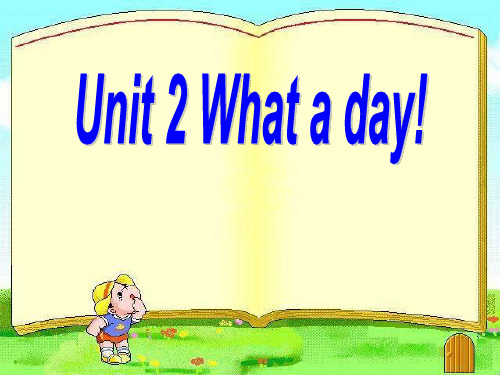
c
c. The children went to the park by bike.
go的过去式
c
a
a. They saw some interesting parrots in the park. see的过去式
c
a
f
f. The weather became windy and cloudy.
默读课文,判断正误,正确
的写T,错误的写F。
F
1.It rained all day(整天) on 20th September(9月20号).
T
2. The children saw a 表演).
parrot show(鹦鹉
T 3.They flew kites in the sky.
T 4.They brought(带来) lunch to the park.
Chinese food
Western (西方)food
They saw some … and … They could … eat the lunch.
There were … in the ... It …
看图片,将下列句子填入方框里, 只填序号。
a. They saw some interesting parrots in the park. b. They were hungry and wet. c. The children went to the park by bike. d. They flew kites in the park. e. They saw ants and bees on their lunch. f. The weather became windy and cloudy. g. It rained.
译林版牛津英语6b全册课文中文翻译
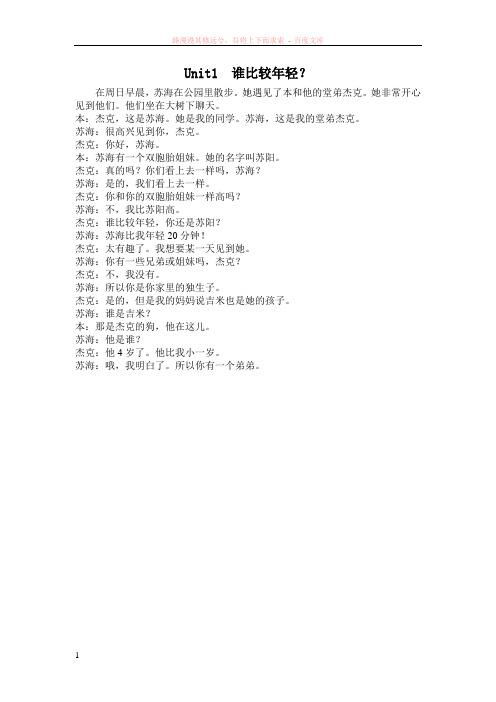
Unit1 谁比较年轻?在周日早晨,苏海在公园里散步。
她遇见了本和他的堂弟杰克。
她非常开心见到他们。
他们坐在大树下聊天。
本:杰克,这是苏海。
她是我的同学。
苏海,这是我的堂弟杰克。
苏海:很高兴见到你,杰克。
杰克:你好,苏海。
本:苏海有一个双胞胎姐妹。
她的名字叫苏阳。
杰克:真的吗?你们看上去一样吗,苏海?苏海:是的,我们看上去一样。
杰克:你和你的双胞胎姐妹一样高吗?苏海:不,我比苏阳高。
杰克:谁比较年轻,你还是苏阳?苏海:苏海比我年轻20分钟!杰克:太有趣了。
我想要某一天见到她。
苏海:你有一些兄弟或姐妹吗,杰克?杰克:不,我没有。
苏海:所以你是你家里的独生子。
杰克:是的,但是我的妈妈说吉米也是她的孩子。
苏海:谁是吉米?本:那是杰克的狗,他在这儿。
苏海:他是谁?杰克:他4岁了。
他比我小一岁。
苏海:哦,我明白了。
所以你有一个弟弟。
Unit2 更多锻炼吉姆擅长英语和数学,但是他不擅长体育。
他想要做得好一些但是不知道怎样做。
他正在和他的父亲讨论关于它的事情。
吉姆:爸爸,我不高兴。
爸爸:怎么了?你做作业需要帮助吗?吉姆:不。
我不擅长体育。
本跑得比我快。
他很强壮。
麦克和本跑得一样快,并且他也是一位优秀的足球运动员。
爸爸:但是我认为你跳得非常高。
吉姆:那是当然。
我比我班级里面的一些男孩跳的高。
爸爸:并且你游泳游得快。
吉姆:是的,但是我的朋友们比我游得快。
爸爸:别担心。
多做些运动。
你会变得更强壮,并且你将更擅长体育。
吉姆:是的,爸爸。
每天我将起得更早并且在上学之前做些运动。
爸爸:真是一个好主意。
吉姆:我会在早晨慢跑去学校并且在放学后玩球类游戏。
不就我将会变得更强壮。
史密斯先生来自澳大利亚,他现在住在南京,他想去参观历史博物馆,但是他不知道路,他在问杨玲怎么去那。
史密斯先生:打扰一下,请问你能告诉我去历史博物馆的路吗?杨玲:让我看看,额,沿着这条街,在第三个路口右转,博物馆就在你的左边,你不会错过的。
史密斯先生:从这到那有多远?杨玲:大约一千米远。
(完整版)【个人精心制作】新译林小学英语6BUNIT2单元知识点总结及单元练习(两套)
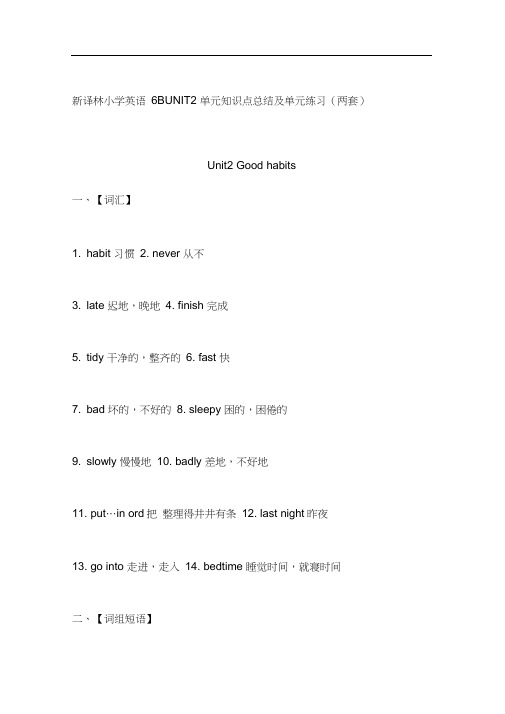
新译林小学英语6BUNIT2 单元知识点总结及单元练习(两套)Unit2 Good habits一、【词汇】1. habit 习惯2. never 从不3. late 迟地,晚地4. finish 完成5. tidy 干净的,整齐的6. fast 快7. bad 坏的,不好的8. sleepy 困的,困倦的9. slowly 慢慢地10. badly 差地,不好地11. put…in ord把整理得井井有条12. last night昨夜13. go into 走进,走入14. bedtime 睡觉时间,就寝时间二、【词组短语】1. try to form good lear ning habits努力养成良好的学习习惯2. a good/bad boy 一个好/ 坏男孩3. have many good/bad habits有许多好/坏习惯4. get up early 早起5. n ever go to bed late 从不晚睡6. brush one ' s teeth 刷牙7. before bedtime 在睡觉前8. at home 在家9. put sth in order 把东西放整齐10. finish one ' s homework 完成(某人的)作业11. before dinner 在吃晚饭前12. liste n to the teachers 听老师讲13. at school 在校14. do well 表现好15. keep the room clea n and保持房间整洁16. help one ' tidy s pare nts 帮父母17. do one ' s homework 做(某人的)作业18. at night 在夜晚,在晚上19. feel sleepy 犯困20. kn ow sb well 对某人了解21. last night 昨晚22. walk fast 走得快23. come to see sb 来看某人24. show sb around 带某人参观25. go i nto 走进26. livi ng room 起居室27. on the floor 在地板上28. under the bed 在床下29. run fast/slowly 跑得快/ 慢30. walk fast/slowly 走得快/ 慢31. sing well/ badly 唱得好/ 坏32. do well/badly 做得好/ 坏33. get up early/ late 起得早/ 晚34. go to bed early /late睡得早/晚35. go to school early/late 上学早/晚36. on time 准时37. run through the grass 奔跑穿过草地38. wash one ' s face洗(某人的)脸39. pick one 挑一张三、【语法】本单元继续学习副词及其用法。
完整word版译林小学英语六年级下6Bunit2知识点与练习

就寝前;睡前5.before bedtime”“秩序;次序;规则6.order表示整理得井井有条……put……in order把keep the clothes away收拾衣服维持秩序补充:keep order )作业写完(他的7.finish (his) homework完成做某事”。finish doing sth. finish意为“完成晚饭前8.before dinner上课听讲9.listen to his teachers在家表现很好10.do well at home方面做得好在……拓展:do well in保持房间干净整洁11.keep the room clean and tidyuntidy/messy tidy干净的,整齐的(反义词)
保持他的房间既干净又整洁11.keep his room clean and tidy
houseworkdohelp his parents帮助某人做某事12.help sbdosth
with my Englishhelp me帮助某人做某事help sbwith sth
/迟13.do one's homework early/late做家庭作业早sleepy/happy/sad/hot/tired感觉 feel ---形容词14.feel +
- 1 -
很了解某人15.know sb.well走得很快16.walkfast】【Grammar timebadly,late,well,slowly,early,1.副词:fast
等。对频度词提问用always, usually, often, sometimes, seldom, never, every day2.频度词:)对划线部分提问。如:He watches TV every day.(how oftenHow often does he watch TV ?
新译林英语6B_全册知识点梳理(重点词汇、句型、语法知识整理)(K12教育文档)
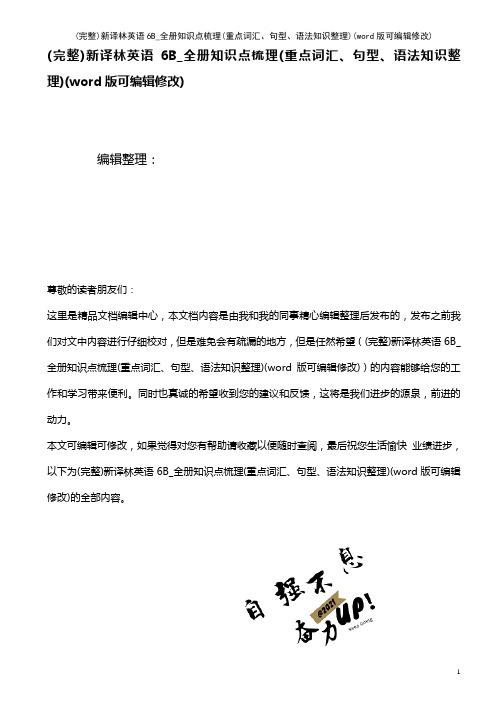
(完整)新译林英语6B_全册知识点梳理(重点词汇、句型、语法知识整理)(word版可编辑修改)编辑整理:尊敬的读者朋友们:这里是精品文档编辑中心,本文档内容是由我和我的同事精心编辑整理后发布的,发布之前我们对文中内容进行仔细校对,但是难免会有疏漏的地方,但是任然希望((完整)新译林英语6B_全册知识点梳理(重点词汇、句型、语法知识整理)(word版可编辑修改))的内容能够给您的工作和学习带来便利。
同时也真诚的希望收到您的建议和反馈,这将是我们进步的源泉,前进的动力。
本文可编辑可修改,如果觉得对您有帮助请收藏以便随时查阅,最后祝您生活愉快业绩进步,以下为(完整)新译林英语6B_全册知识点梳理(重点词汇、句型、语法知识整理)(word版可编辑修改)的全部内容。
6下Unit 1 The lion and the mouse知识点梳理一词组1. in the forest 在森林里2。
walk by 走过;路过3。
wake up 醒,醒来 4. wake sb up 把某人叫醒5. be angry with sb 对某人生气6. the next day 第二天7. be angry at sth 对某事生气8. want to do sth 想要做某事9. want sb to do sth 要某人做某事 10. some day 某一天11. say quietly 小声地说12. sit quietly 静静地坐着13. laugh loudly 大声地笑14。
let sb do sth 让某人做某事15. catch the lion with large net 用一口大网捉住狮子16. bite the net with sharp teeth 用锋利的牙齿咬网17。
ask sadly 难过地问,伤心地问18. just then 就在那时19。
say happily 开心地说, 20. from then on 从那时起21. become friends 成为朋友22。
牛津译林版六年级英语下册Unit-2-Good-habits第二单元第二课时优秀课件

99、加快培育和发展以重大技术突破、重大发展需求为基础的战略性新兴产业,对于 推进产业结构升级和经济发展方式转变具有重要意义。下列均属于战略性新兴产业的 是。 A.节能环保、房地产、农业和生物育种、新材料 B.新能源汽车、载人航天、新能源、金融
⑤原始人、生活在和谐社会中的人们,之所以不适应“血汗工厂”的生产生活方式,不 适应欠缺和谐的社会,就在于他们的心理模式、性格,和后者需要的心理和性格基础 对不上号,更准确地说,是他们不具有后者所要求的那种社会性格:守纪律、服从、 对金钱或消费有欲望、奴性、盲目地认同
将以上5个句子重新排序,语序正确的是______。 A.②⑤③④① B.②①③④⑤ C.①②⑤④③ D.④①③②⑤
!"#$
%&
6
**
,
,
*0* 123456 7
,'&+
,!"#$-."#$/#
,%/($)
,%&
6
Let’s watch
点击播放Sound time 课文动 画
19
Sound time.
读单词,注意or在单词中的发音!
or
for
horse
[ɔː]
short
sport
20
Sound time. 读句子,注意or的发音! Four short horses, Running through the grass. Four short horses, Running very fast!
(完整word版)小学牛津英语译林版6B英语知识点

(完整word版)小学牛津英语译林版6B英语知识点Unit1 The lion and the mousemouse复数老鼠mice 鼠标mousesbig,large区不large:常指面积或范围大,有广大和众多的含义,其反义词是small。
large 比较正式。
big:常指程度,规模,容积,分量,数量大,含有庞大、笨重的意思,还可表示“伟大,重要”之意,其反义词是little,big较为口语化wake up:up是副词,别可后接代词,代词放中间,名称中间后面都能够放。
the next day 翌日,是指某个特定时刻的后一天,既可指过去,也可指未来tomorrow是指从今天向后的一天,即改日some day 表示未来别确定的某一天,表示未来的时刻状语,所以时态用普通未来时just then 就在那时,表示过去的时刻状语,所以时态用普通过去时from then on 从那时起,表示过去的时刻状语,所以时态用普通过去时from now on 从今以后,表示未来的时刻状语,所以时态用普通未来时副词接在动词后面speak loudly形容词接在名词前面或be动词后面作表语the old manwalk by走过路过let...go 释放敞开pour...into把......倒入in the forest 在森林里large and strong又大又壮so small and weak 那么小和弱let sb. do 让某人干某事well done 干得好get out from the net破网而出become friends变成朋友cheer for...为...而欢呼be good at ...=do well in...擅长in the ground在地上in the hole在洞里look sad看起来伤感with his teeth 用他的牙齿catch(caught)...with用...捉住...have an idea有一具主意(想法)have a good(bad) idea 反义词strong 与weak(同音词week) bite过去式bit hit过去式hitunit2 good habits宾语补脚语:英语中,有点及物动词后接宾语时,还需要加一具词或短语来补充讲明宾语的事情,如此的词或短语叫做宾语补脚语。
牛津小学英语6B全册教案2-2
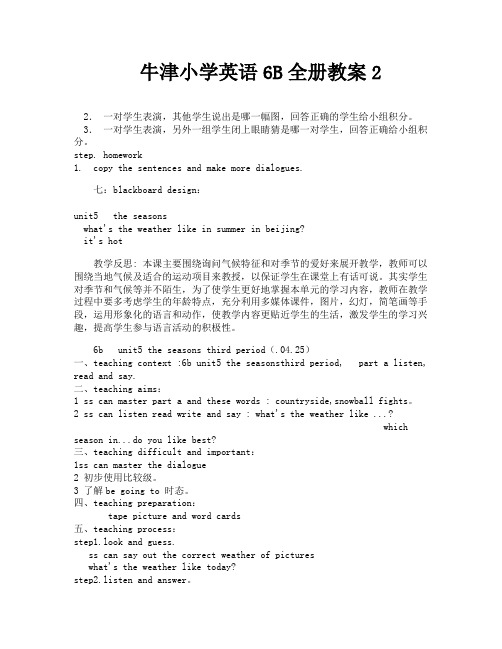
牛津小学英语6B全册教案22.一对学生表演,其他学生说出是哪一幅图,回答正确的学生给小组积分。
3.一对学生表演,另外一组学生闭上眼睛猜是哪一对学生,回答正确给小组积分。
step. homework1. copy the sentences and make more dialogues.七:blackboard design:unit5 the seasonswhat's the weather like in summer in beijing?it's hot教学反思: 本课主要围绕询问气候特征和对季节的爱好来展开教学,教师可以围绕当地气候及适合的运动项目来教授,以保证学生在课堂上有话可说。
其实学生对季节和气候等并不陌生,为了使学生更好地掌握本单元的学习内容,教师在教学过程中要多考虑学生的年龄特点,充分利用多媒体课件,图片,幻灯,简笔画等手段,运用形象化的语言和动作,使教学内容更贴近学生的生活,激发学生的学习兴趣,提高学生参与语言活动的积极性。
6b unit5 the seasons third period(.04.25)一、teaching context :6b unit5 the seasonsthird period, part a listen, read and say.二、teaching aims:1 ss can master part a and these words : countryside,snowball fights。
2 ss can listen read write and say : what's the weather like ...?which season in...do you like best?三、teaching difficult and important:1ss can master the dialogue2 初步使用比较级。
六年级英语上册Unit6第2课时GrammartimeFuntime教学课件牛津译林版

factories …
吵闹的
What makes our city …?
dirty
… makes our city …
rubbish waste paper
messy crowded
拥挤的
cars trucks (卡车) people buildings
dusty
noisy
多灰尘的
吵闹的
smelly
park. 3.There ___is__ (be) much smoke in the sky. 4.Liu Tao can _m_a_k_e_ (make) his bed now.
5.The rubbish _m_a_k_e_s (make) the street dirty.
6._T_h_r_o_w_ (throw) the rubbish in the bin. 7.It means “No s_w_i_m_m_i_ng__ (swim)”. 8._T_o__k_e_e_p (keep) the air clean, we can
Summary
1. make/keep + 名词(宾语)+ 形容词(补语) make the air dirty Keep our city clean
2. 情态动词can的用法 —What can we do to …? —We can take/walk/move …
Homework 01 抄写Grammar time中的句子,并熟读。 02 设计一张关于城市环保的海报。
in the bin. 3._T_o__m_a_k_e_ the air clean, we can plant more trees. st Tree Planting Day, we _p_la_n_t_e_d_ about 50 trees. 5.We _m__ov_e_d_ more factories away from our city last year.
译林版六年级英语上册课件Unit 2 (Grammar-Fun time)

Retell time
Uniபைடு நூலகம்2 What a day!
--------Yang Ling’s diary
But they saw some ants and beeson their food. so they could not eat their lunch.
Retell time
Unit2 What a day! --------Yang Ling’s diary
some drinks,too. They
(see/saw) some
insects. They (have/had) a good time.
Exercise (注意时态)
用所个词的适当形式填空 1. Emma ________ (watch) TV every day. 2. He________ (listen) to music yesterday. 3. There _____ (be ) a football game on TV yesterday evening. 4.I like _______ (sing) . 5. Listen! The children _________(sing). 6. Jack _____(stop) the car in the street yesterday. st Sunday,We _______ (have) a picnic in the park. Then we ______ kites high in the sky.
Review the new words
snowy 有雪的
Retell time
Unit2 What a day! --------Yang Ling’s diary
六年级英语下册Unit 2 Good habit(Grammar -Fun time)译林版 (2)
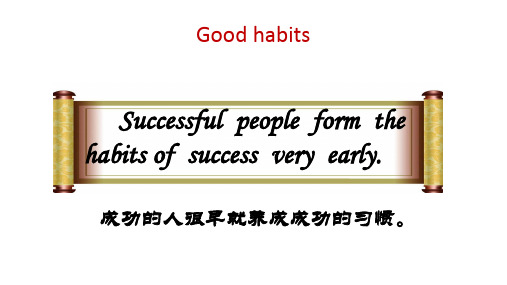
— Does she do _________ at school? — Yes. She’s _________ at all subjects. 5. Liu Zhihan is a good student. She studies very _________ . She always listens _________ in class.
always usually often sometimes seldom never …
get up go to bed finish one’s homework play football listen to teachers jump do …at school laugh write walk work …
Let’s speak
get up early never go to bed late
brush his teeth always put …in order
usually finish his…
listen to… do well
keep…clean and tidy help his ...
Let’s speak
go to bed early
sleep deeply
头脑风暴:根据图 片说出尽可能多的 动副词组
go to bed late
…
sleep well
…
…
…
…
…
2025年译林版六年级下册英语Unit 2课时练 2 Grammar time-Fun time
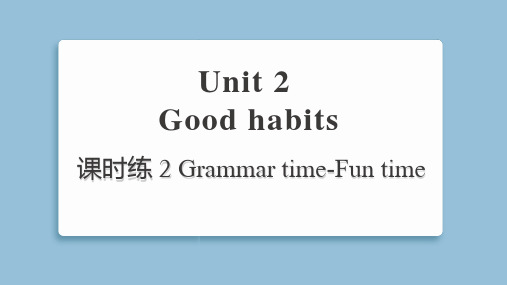
A. often
B. never
C. always
【点拨】根据“It’s a good habit.” 和“goes to bed late”, 可知应该是从不晚睡,故选B。
基础题
( C ) 5. You _____ so tired. Do you feel _____?
A. looked; sleepy
Unit 2 Good habits
课时练 2 Grammar time-Fun time
习题链接
温馨提示:点击 进入讲评
一
二
三
四
五
六
基础题
一、用所给单词的适当形式填空。 1. Mike always ___h_a_s__ (have) noodles for supper.
【点拨】Mike 是第三人称单数,其后动词用第三人称 单数形式,故填has。
综合应用题
He is 2. ____ London. He is twelve years old. He is a student
of Grade Six.
( A ) 2. A. from B. of
C. to
D. in
【点拨】be from 意为“来自”,故选A。
综合应用题
Mike is a clever student. He studies very 3. ____. He’s good at all his lessons. ( C ) 3. A. good B. better C. hard D. bad
基础题
( T ) 3. She keeps her desk clean and tidy. ( T ) 4. She washes her hands in the morning. ( T ) 5. She hangs up her clothes by herself.
译林小学英语六下6BUnit2
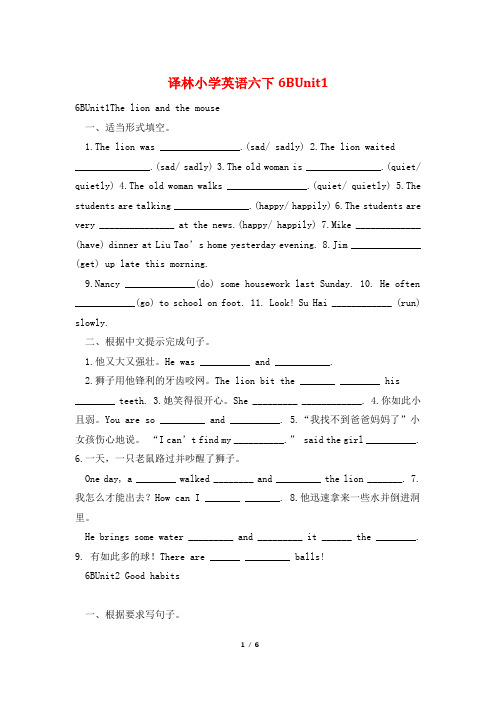
译林小学英语六下6BUnit16BUnit1The lion and the mouse一、适当形式填空。
1.The lion was ________________.(sad/ sadly)2.The lion waited_______________.(sad/ sadly) 3.The old woman is _______________.(quiet/ quietly) 4.The old woman walks ________________.(quiet/ quietly) 5.The students are talking _______________.(happy/ happily) 6.The students are very _______________ at the news.(happy/ happily) 7.Mike _____________ (have) dinner at Liu Tao’s home yesterday evening. 8.Jim ______________ (get) up late this morning.9.Nancy ______________(do) some housework last Sunday. 10. He often ____________(go) to school on foot. 11. Look! Su Hai ____________ (run) slowly.二、根据中文提示完成句子。
1.他又大又强壮。
He was __________ and ___________.2.狮子用他锋利的牙齿咬网。
The lion bit the _______ ________ his________ teeth. 3.她笑得很开心。
She _________ ____________. 4.你如此小且弱。
(2021年整理)译林版小学英语6BUnit2考点精练(推荐完整)
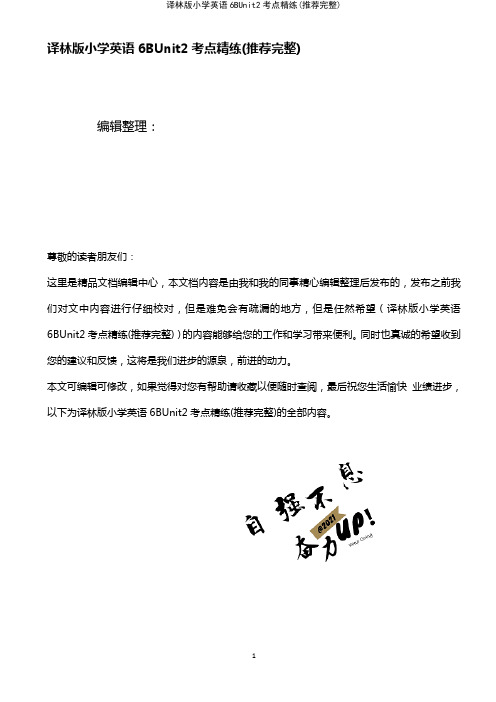
译林版小学英语6BUnit2考点精练(推荐完整)编辑整理:尊敬的读者朋友们:这里是精品文档编辑中心,本文档内容是由我和我的同事精心编辑整理后发布的,发布之前我们对文中内容进行仔细校对,但是难免会有疏漏的地方,但是任然希望(译林版小学英语6BUnit2考点精练(推荐完整))的内容能够给您的工作和学习带来便利。
同时也真诚的希望收到您的建议和反馈,这将是我们进步的源泉,前进的动力。
本文可编辑可修改,如果觉得对您有帮助请收藏以便随时查阅,最后祝您生活愉快业绩进步,以下为译林版小学英语6BUnit2考点精练(推荐完整)的全部内容。
译林版小学英语6BUnit2考点精练(推荐完整)编辑整理:张嬗雒老师尊敬的读者朋友们:这里是精品文档编辑中心,本文档内容是由我和我的同事精心编辑整理后发布到文库,发布之前我们对文中内容进行仔细校对,但是难免会有疏漏的地方,但是我们任然希望译林版小学英语6BUnit2考点精练(推荐完整)这篇文档能够给您的工作和学习带来便利。
同时我们也真诚的希望收到您的建议和反馈到下面的留言区,这将是我们进步的源泉,前进的动力.本文可编辑可修改,如果觉得对您有帮助请下载收藏以便随时查阅,最后祝您生活愉快业绩进步,以下为〈译林版小学英语6BUnit2考点精练(推荐完整)〉这篇文档的全部内容。
6年级下册 Unit 2A卷:课堂点拨题Story time1. 复习“一般现在时"(1) Liu Tao sometimes _______ his homework before dinner。
A. finishesB. finishsC. finished(2) Mr Smith swimming every weekends。
But he do it last week.A. goes; didn’t B。
goes to; didn't C. went; didn’t D。
goes;doesn’t(3) —-How do ______ go to work ? —-On foot.A. your auntB. his uncle C。
牛津英语6BM2-U2

牛津英语6BM2- Unit 2 Seasonal changes一、教学目标:1.学习目标:①学习用why 来询问原因以及用because来回答;②学习用with构成的介词短语来做定语修饰名词;③情态动词must的用法。
2.能力目标:①能仿照课本运用一般现在时描述自己的校园生活;②能仿照课本简单描述自己的校服;3.情感目标:通过对课文的学习,培养学生对校园生活的喜爱之情。
二、教学重点:1.能正确听、说、读、写四会单词;2.能正确理解掌握、句型:1)Many students like studying in the library because it is air-conditioned.Not many students like playing in the playground because it is hot.2) Why do many students (not) like studying in the library?Because it is air-conditioned.3) Boys must wear white shirts with short sleeves.4)能正确使用情态动词must;三、教学考点:1.包含以上教学重点;2.with 和without 的用法。
四、课前准备:教具准备:教师自定板书准备:预先写好课题Unit 2 Seasonal changes、重点单词、重点句型.五、教学步骤:1.free talk about school life.2.单词讲解:1)seasonal adj. 季节性的season n. 季节复习四季:spring 春季summer 夏天autumn 秋天winter 冬天(in + 季节)2)change n.变化seasonal changes 季节性的变化v. 变化change ...into ... 把...变为...3) life n.生活school life 学校生活n. 生命in one’s life 在某人的一生中(复数lives)4) around adv. 周围fly around / walk around 到处飞,到处走prep 在...周围around the school 在学校周围5)air-conditioned adj.有空调的强调发音和中间连字符air n. 空气airport n. 飞机场复习by air 乘飞机6)study v. 学习study hard/work hard努力学习复习learn 学习learn to do sth.学习做某事learn from 向...学习7)canteen n.食堂强调重音所发音的位置in the canteen 在食堂里8)keep warm 保暖keep v. 保持keep +adj. keep quiet 保持安静9) snowman n. 雪人snowmen (复数)make snowman 堆雪人复习各种天气以及它们的形容词形式:snow 下雪snowy 下雪天的rain 下雨rainy 下雨天的wind 刮风windy 刮风的cloud 多云cloudy 多云的10)hot drink 热饮drink n.喝soft drink 软饮料v.喝drink a cup of water 喝杯水11)notice n.通知write a notice 写一份通知notice board 布告栏(复习)12)early adj.早期的early April 四月上旬The early bird catches the warm 早期的鸟儿有虫吃。
- 1、下载文档前请自行甄别文档内容的完整性,平台不提供额外的编辑、内容补充、找答案等附加服务。
- 2、"仅部分预览"的文档,不可在线预览部分如存在完整性等问题,可反馈申请退款(可完整预览的文档不适用该条件!)。
- 3、如文档侵犯您的权益,请联系客服反馈,我们会尽快为您处理(人工客服工作时间:9:00-18:30)。
Review
I We They He He always usually often sometimes never have my meal finish our homework do their homework feels sleepy goes to bed on time. before dinner. in the evening. in the morning. late.
early /late
How
early /late morning well/badly at home
at night early /late
Do a survey
Work in groups.
Name Activities go to bed How
early
When/Where at night
Try to recite
“Good habits”
LiuTao is a good boy too. He listens to his teachers at school. He also does well at home. He keeps his room clean and tidy. He also helps his parents. But Liu Tao has some bad habits. He often does his homework late at night and does not go to bed early. He sometimes feels sleepy in the morning.
同学们,让我们一起来做一张好习惯倡议书吧!
Good habit proposal
I never stay up late. I always keep room clean. I often save money(省 钱) on Taobao.
如果你觉得always做某件 事很困难,可以选择 usually/often/sometimes …
Good habit proposal
Tips Everyone says one sentence 小组成员每人说一句 All group members say together 小组成员一起说 Only group leader says 小组选一个代表说 Award
Tip: 你还能再想出一个好习惯吗?请写在空白纸条上吧!
Try to recite
“Good habits”
Wang Bing and Liu Tao are friends. Wang Bing knows Liu Tao well. • Did you go to bed late last night, Liu Tao? • Yes, but I’m not sleepy. I can walk fast. • Ouch! • You shouldn’t go to bed late, LiuTao.
Tip: 如果是第三人称,不要忘记动词的变化哦!
Name Activities go to school How early When/Where in the morning
do
go to bed
well
early
at home
at night
Let's make !
What good habits should we have?
Think and write P18
• • • • • • • I always get up early in the morning. I never go to school late. I usually listen to my teachers at school. I often finish my homework early. I sometimes help my parents at home. I … keep my room clean and tidy. I … go to bed early at night.
Unit 2 Good habits
Fun + Grammar
Try to recite
“Good habits”
WangBing is a good boy . He has many good habits . He gets up early in the morning and never goes to bed late. He brushes his teeth in the morning and before bedtime. At home, Wang Bing always puts his things in order. He usually finishes his homework before dinner.
人称代词
频度副词
动词时间/地点Gra Nhomakorabeamar time
Let’s make a survey form
Name Activities
go to bed Name Activities go to school do go to bed
How
When/Where
at night When/Where in the
Fun time Pick and say
Pick one! OK.
Do you go to bed early? Yes, I do.
That’s a good habit.
Thank you!
Pair work
Tip: Pick one picture and practice in pairs.
Think and write P18
• • • • • • • Get up early in the morning. Do not go to school late. Listen to your teachers at school. Finish your homework early. Help your parents at home. Keep your room clean and tidy. Go to bed early at night.
